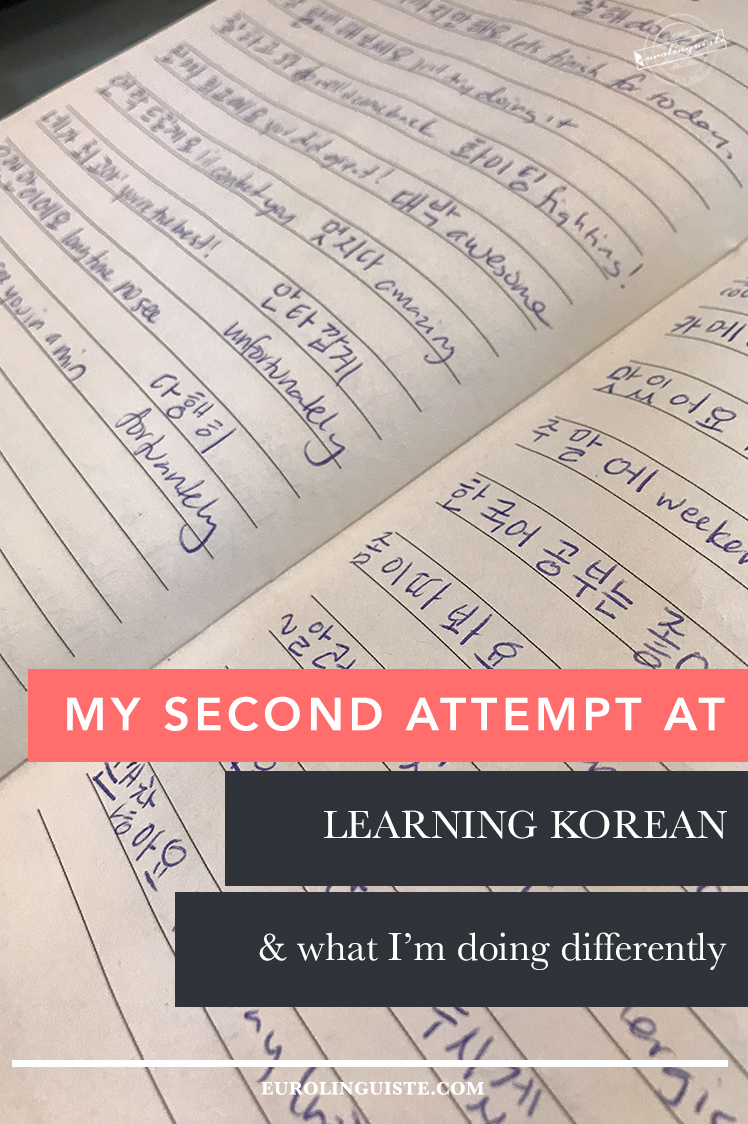Learning Korean All Over Again: Why a Break from Your Language Learning Can Be a Good Thing

My name is Shannon Kennedy and I'm the language lover,…
I often feel guilty for taking breaks. I feel as though I’m not doing the right thing if I’m not being productive.
I also hate to give things up once I’ve already invested a lot of time into them.
With Korean I did the first – I took a long break (read: more than a year) and I was afraid I was going to end up doing the second. Give it up.
When a Language isn’t a Good Match
When I took on Korean, I wasn’t new to learning languages. I had gone through the process successfully a few times at that point. And I had done it with languages from completely different families – so it wasn’t because it was the first time I took on a language that was totally new. I was no stranger to new writing systems and few loan words.
But there was something about Korean that just didn’t stick. I struggled with the writing system even though it is arguably one of the easier systems to learn. Pronunciation and grammar eluded me and new vocabulary went in one ear and out the other.
After six months, I had enough. It was frustrating to put in a ton of work and not see the results I had come used to seeing with my language studies. I set aside my Korean studies to work on something else. I desperately needed to experience a “win”, so I worked on Spanish for three months.
It was a good reminder that I *can* learn a language. I had the skill.
So what was it about Korean?
Perhaps Korean and I just weren’t well-matched?
When a New Language Just Doesn’t Stick
When learning a new language, it’s normal to go through periods where you feel like that material just doesn’t stay with you. No matter what you do, how much study or what kind of study, you feel lost.
With Korean, I never had a “eureka” moment where things started to come together. I felt lost and frustrated pretty much all the time.
Taking time away from the language ended up being exactly what I needed.
Why a Language Break is a Good Thing
When I hit roadblocks in my language learning, I usually work to break through them using one of two tactics:
1. I keep pushing through
2. I take a break
In the past, I typically kept pushing through. I believe that breakthroughs don’t suddenly strike, but instead, they’re the result of slowly chipping away at barriers each day until all that remains is to navigate through the remains.
At first, I tried to do this with Korean, but it didn’t seem to help. The barriers seemed insurmountable. So instead, I decided to take a break, experience a relatively quick win with Spanish, and reinvigorate both my energy and my confidence.
A few weeks ago, I made a new commitment to Korean. I debated whether or not I’d give the language up, but I just couldn’t bring myself to do it. I don’t particularly have any single compelling reason to learn the language, but there’s just something that draws me to it. And even though I’ve studied Spanish, Russian, Croatian, Japanese and even did an Italian refresh since Korean and I last spent time together, I still saved resources for when I’d “one day get back to it” on the side.
Picking up Korean a second time has been far more rewarding than the first.
When at First You Don’t Succeed
The first time I tried to learn Korean, I felt like I wasn’t absorbing anything. Now that I’ve resumed studying the language, I’ve found that this impression wasn’t accurate.
I don’t remember a lot in the language, but looking at the material a second time means that I have this vague familiarity with the material that gives it a little more stickiness than the first time around. That means, more stayed with me than I originally thought.
For example, I still confuse some of the Korean vowels when reading – especially those that start with a ‘w’ – but I was able to quickly learn the other letters and start reading at a basic level almost immediately (something I didn’t feel that I succeeded at the first time around).
I also do better at remembering vocabulary and grammar. Particularly because I now have several months of experience with Japanese. Learning Korean grammar through the lens of a Japanese “speaker” has really helped me. (As a side note, if you’re interested in learning both Japanese and Korean, I highly recommend learning Japanese first.)
Learning Korean suddenly seems like a real possibility. That break gave me time to digest and process what I learned even though I didn’t realize it was happening.
How Taking a Break from Korean Helped Me Learn It Better
While the amount of time I took away from Korean was a little extreme, I honestly feel as though that time away played a big part in the results I’m experiencing today. If I hadn’t taken a break, I would have definitely burnt out and have dropped the language forever rather than for a little over a year.
That time away allowed me to accomplish a few things:
I was able to digest what I had learned.
Even though I didn’t remember a lot of it, it gave me a sense of familiarity with the language so the vocabulary and grammar didn’t seem so far removed the second time around. I often found myself thinking things like, “ah yes, I do remember how to make a sentence negative” or “that’s right, I remember how to say that”.
I was able to learn a similar language.
In that time apart from Korean, I didn’t stop learning languages entirely. Instead, I used it to learn another language that was on my list and that was similar enough that it helped me wrap my head around parts of Korean that I struggled with the first time around. After learning Japanese, particles suddenly made more sense as did honorifics and sentence order. I’m sure my initial work with Korean also helped me with Japanese though I wasn’t really aware of it at the time. Now it’s come full circle – my Japanese is helping me take on Korean.
I became a better language learner.
In the last year, I feel as though I’ve truly refined how I learn languages and have built a system that works for me. I’m sure this system will continue to evolve as I grow and change as a language learner, but this has certainly helped me approach Korean in a more effective way than my past efforts.
I’m less afraid to speak the language.
When I first learned Korean, the only opportunity I gave myself to use it was when I’d go to the doctor (which was fairly often because I was pregnant). I’d write out a few flashcards with phrases I wanted to use, and then it was hit or miss if I could use them during my appointments. I was often too nervous or embarrassed to speak in Korean for any length of time. Today, I am much more confident speaking my languages – even if they’re ones I don’t yet know all that well. I’ve come to accept it as a part of the process. Before, I fought it.
I feel more motivated to learn Korean.
Towards the end of my first six months (before the break), I was feeling pretty overwhelmed and not all that motivated to continue. After having stepped away, that motivation has reappeared.
I realized that I really do want to learn Korean.
During my break from Korean, I spent some time really thinking about whether I not I wanted to or should learn Korean. It wouldn’t be the first time I had given up a language (I’m looking at you high school Arabic and university German), but there was just something that didn’t sit right with me whenever I tried to convince myself to let it go. Having the time to think about it (without being knee-deep in study when it’s harder to remove yourself and think about it objectively) allowed me to determine that being able to speak Korean was something that I really wanted.
How to Make Sure That a Break is a Positive Thing for Your Language Studies
After taking a break from Korean, I realized that there are a few things that you can do to make sure that the breaks you take remain a positive thing for your language studies. Here’s what I found:
1. If you take a break, make a plan for how you’ll get back into your studies. If you take a break without a plan, you risk never picking your studies back up again. For me, Korean was always on my list of things that I was going to do “next”. When a new opportunity came up, it was always “Korean or this” or “Korean or that”. Eventually, I ran out of “or’s” so I forced myself to make a decision about whether or not I’d continue studying Korean. Korean was always on my calendar (even if it did get pushed back a few times), so I knew I’d have to deal with it eventually.
2. Taking a break after an introduction to a language is a good way to dip your toes in the water before jumping all the way in. You get a feel for the temperature before completely submerging yourself.
3. If you take a break, don’t remove yourself from the language completely. It’s okay to stop studying for a time, but try to maintain some other exposure to the language. For me, this was music.
To Sum Up
Taking a break from your language is not a magic answer. In fact, it can be dangerous. A break can quickly become more than just a break. And restarting a habit is so much more difficult than starting it in the first place. That said, as long as you set yourself up so that the break is really and truly a “break” and not something more than that, it can be extremely beneficial.
To quote an article in the Atlantic, “Just as small breaks improve concentration, long breaks replenish [..] performance.”
You won’t learn a language without work but it does make processing what you’re learning easier. You can look at what you’re doing objectively and make a more informed decision. Plus, taking a break after a brief introduction to the language gives you time to digest completely new concepts so that when you go all in, you have a little bit of a foundation.
What about you?
Have you ever taken a break from a language? Did it reinvigorate your interest in the language or make you realize that it wasn’t something you really wanted?
I’d love to hear about your experience in the comments below.
My name is Shannon Kennedy and I'm the language lover, traveler, and foodie behind Eurolinguiste. I'm also the Head Coach of the Fluent in 3 Months Bootcamp, co-founder of Women in Language, and former Resident Polyglot at Drops.



